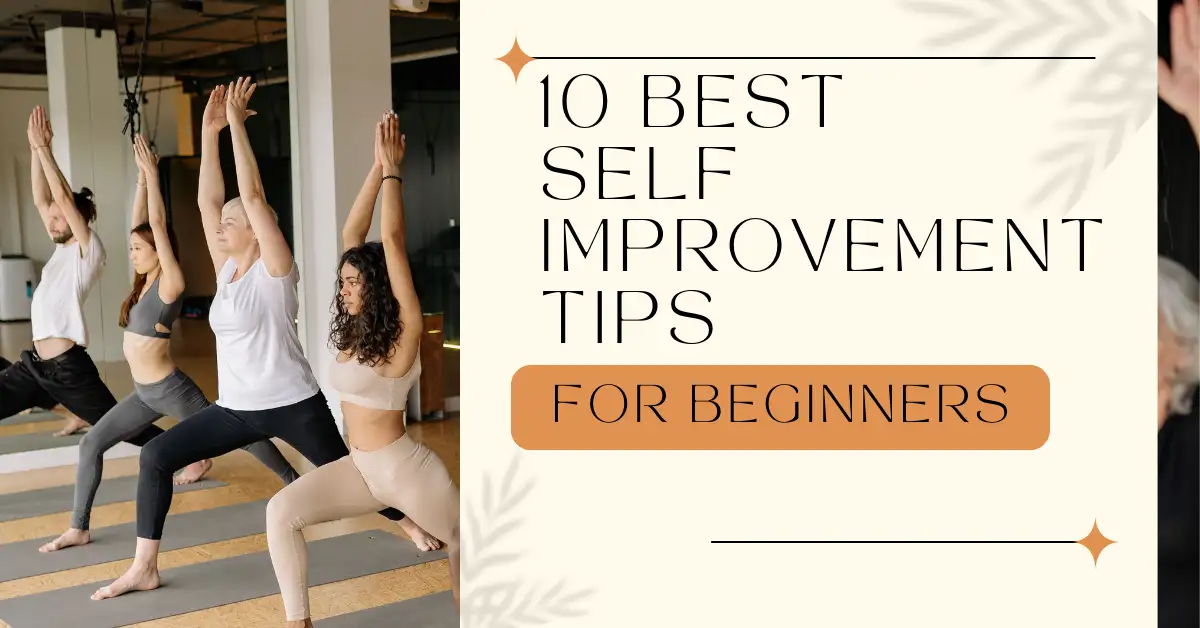Ever feel like everyone else has their life figured out while you’re still trying to match your socks in the morning? Trust me, we’ve all been there. The journey of personal growth isn’t about becoming perfect – it’s about becoming better than you were yesterday.
But here’s the thing: most self-development advice out there feels like it’s written for people who already have their act together. You know, those folks who wake up at 4 AM to meditate while sipping green juice. That’s not what this is.
Instead, I’m sharing 10 beginner-friendly advice tips that actually work in the real world. No fancy jargon, no impossible standards – just practical steps you can start using today.
1. Start with Clear Goals
Setting clear goals is the first step to self-improvement. Without a clear direction, it’s easy to feel lost or unmotivated.
I learned this the hard way. Years ago, I set a vague goal to “get healthier.” After three months, I had no idea if I was making progress. Now I use goal-setting techniques that actually work.
The most effective way to set goals is using SMART objectives. According to the Dominican University of California, people who write down their goals are 42% more likely to achieve them. Here’s what this means in simple terms:
- Specific: “I will walk 30 minutes daily” (not “I’ll exercise more”)
- Measurable: “I will save $300 monthly” (not “I’ll save money”)
- Achievable: “I will read 2 books monthly” (not “I’ll read 100 books this year”)
- Relevant: Choose goals that matter to your life right now
- Time-bound: Set a deadline for each goal
Pro tip: Break down your big goals into weekly targets. Want to lose 20 pounds? Focus on losing 1-2 pounds per week through achievement planning.
2. Develop a Morning Routine

A morning routine sets the tone for your entire day. It helps you start with focus and energy, making it easier to stay productive.
I used to be the world’s worst morning person. I’d hit snooze six times and rush out the door with mismatched socks. Everything changed when I built productive morning habits. Now, my days start with purpose instead of panic.
Here’s a simple way to build morning success rituals:
- Wake up 15 minutes earlier than usual
- Drink a full glass of water first thing
- Make your bed (it’s a small win that builds momentum)
- Do 5 minutes of stretching
- Spend 10 minutes planning your day
The secret is daily routine optimization through small steps. Don’t try to change everything at once. Start with one habit and practice it for a week before adding another.
Pro tip: Put your phone on airplane mode and keep it there for the first hour of your day. Your brain needs time to warm up before tackling the world’s demands.
3. Practice Mindfulness
Mindfulness is about focusing on the present moment without judgment. It helps reduce stress and improves your overall well-being. If you’re looking for more strategies to enhance your daily self-improvement journey, explore 7 Powerful Ways to Improve Yourself Daily That Actually Work.
I used to think meditation benefits were just hype. My mind raced constantly, and I couldn’t sit still for two minutes. Then I learned present-moment awareness through a simple exercise: focusing on my breath for just one minute each day. That single minute grew into five, then ten. Now, I handle stress better and think more clearly.
Here are three stress reduction techniques you can try today:
- Box breathing: Breathe in for 4 counts, hold for 4, out for 4, hold for 4
- The 5-4-3-2-1 method: Notice 5 things you see, 4 you feel, 3 you hear, 2 you smell, and 1 you taste
- One-minute pause: Set a timer and just focus on your breathing
You don’t need a meditation cushion or a silent room. Practice mindfulness while washing dishes, walking to work, or waiting in line. The key is to focus on one thing at a time.
Pro tip: Start with just 60 seconds of mindful breathing each morning. Your mind will wander – that’s normal. Just gently bring your attention back when it does.

4. Read Regularly
Reading is your direct line to the world’s best thinkers. It’s like having coffee with Einstein, Jobs, and Gandhi all at once. Books aren’t just paper and ink – they’re concentrated wisdom waiting to be unlocked.
I used to hate reading. Netflix was more fun, and social media was easier. However, my knowledge acquisition was limited to 280-character tweets. Then I tried the 10-page challenge: just 10 pages before bed. Those pages added up, and now I average 30 books a year.
Here’s how to build your reading habit:
- Start with 10 pages daily (about 20 minutes)
- Read during a specific time (morning commute or before bed)
- Keep a book on your phone for unexpected free time
- Take notes to boost learning retention
For beginners, I recommend these game-changers:
- “Atomic Habits” by James Clear (for building better habits)
- “The Psychology of Money” by Morgan Housel (for better money decisions)
- “The Happiness of Pursuit” by Chris Guillebeau (for finding your path)
Pro tip: Your reading comprehension improves when you discuss books with others. Join a book club or share insights with friends. Reading alone is good – reading with others is great.
5. Exercise Consistently
Regular physical activity is crucial for both mental and physical health. Research from the Mayo Clinic shows that consistent exercise improves mood, energy, sleep quality, and overall wellness. Your body needs movement just as much as your brain needs rest.
I was the classic yo-yo exerciser. I’d hit the gym hard for two weeks, then quit for two months. Everything changed when I stopped chasing six-pack abs and focused on building physical fitness habits that stuck. The secret? Starting ridiculously small.
Here’s how to build workout motivation that lasts:
- Begin with 5-minute walks after dinner
- Add one push-up or squat each day
- Track your progress in a simple app or notebook
- Choose activities that don’t feel like punishment
The key to exercise adherence is finding movements you actually enjoy:
- Hate running? Try dancing
- Gym anxiety? Work out at home
- Don’t like solo workouts? Join a sports team
- Bored easily? Mix up your routine weekly
Pro tip: The best exercise isn’t the one that burns the most calories – it’s the one you’ll actually do consistently. Start with 10 minutes daily. No workout is too small when you’re building a lifetime habit.

6. Manage Your Time Effectively
Time is like money – once you spend it, you can’t get it back. The difference? You can always earn more money, but you’ll never get more than 24 hours in a day.
I used to jump between tasks like a squirrel after coffee, finishing nothing and stressing about everything. Learning basic time management skills changed everything. Now I get more done in 4 focused hours than I used to in an entire day.
Here’s how to master productivity techniques that actually work:
- Write down your 3 most important tasks each morning
- Use 25-minute focused work blocks (work on one task only)
- Take 5-minute breaks between blocks
- Turn off phone notifications during focus time
Task prioritization becomes simple with these questions:
- What needs to be done today?
- What moves me closer to my goals?
- What can wait or be delegated?
Pro tip: Track how you spend your time for one day. Most people are shocked to find they waste 2-3 hours on social media and random web browsing. Replace just one hour of scrolling with focused work, and you’ll gain 365 hours per year.
7. Cultivate Positive Relationships
Your relationships are like the five people you spend the most time with – added together and divided by five. That’s why the company you keep directly impacts who you become.
I learned this the hard way. I stayed in toxic friendships because I feared being alone. But these draining relationships were like anchors, holding me back from growth. When I finally started being selective about my social connections, everything changed.
Here are proven relationship-building strategies that work:
- Schedule regular check-ins with positive friends
- Join groups aligned with your interests
- Remove or limit contact with negative influences
- Practice active listening in conversations
- Show up for others when they need support
Setting boundaries is crucial for networking strategies that last:
- Learn to say “no” without guilt
- Be clear about your time limits
- Communicate your needs directly
- Don’t apologize for having boundaries
Pro tip: Quality beats quantity every time. It’s better to have three genuine friends who lift you up than thirty casual connections who drain your energy.

8. Learn Continuously
Continuous learning is essential in our rapidly changing world. Research shows that people who actively learn new skills are more adaptable, innovative, and successful in their careers.
I used to think learning ended with school. Then I discovered lifelong learning through podcasts during my commute. That simple start snowballed into a daily habit of growth. Now, I learn something new every day, whether it’s a cooking technique or a business strategy.
Here’s how to make learning part of your daily life:
- Listen to educational podcasts while doing chores
- Take free online courses on topics that interest you
- Follow experts in your field on social media
- Try one new thing each week
- Teach others what you learn (it helps you retain information)
Make personal growth automatic with these habits:
- Set aside 20 minutes daily for learning
- Keep a “things I want to learn” list on your phone
- Join online communities in your areas of interest
- Take notes on everything you learn
Pro tip: Focus on learning transferable skills – things that are useful in multiple areas of life. Communication, problem-solving, and digital literacy are golden tickets in any field.
9. Practice Self-Care
Most people get self-care completely wrong. They think it’s about expensive spa treatments or binge-watching Netflix. But real self-care is about maintaining your basic health and energy, just like regular oil changes keep your car running.
I used to think self-care was selfish. I’d work until burnout, then crash for days. Learning proper wellness routine basics changed everything. Now I know that small daily actions prevent major breakdowns.
Here’s the difference between self-care and self-indulgence:
- Self-care: Getting enough sleep, eating well, setting boundaries
- Self-indulgence: Retail therapy, binge-watching Netflix all weekend, avoiding responsibilities
Build sustainable mental health habits with these steps:
- Go to bed and wake up at the same time daily
- Take 10-minute breaks every 2 hours
- Spend 30 minutes outdoors each day
- Say “no” to non-essential commitments
- Schedule regular health check-ups
Simple self-care practices to start today:
- Drink water when you wake up
- Take three deep breaths before checking your phone
- Walk during phone calls
- Write down three good things each evening
Pro tip: Self-care isn’t what you do when you’re burnt out – it’s what you do to prevent burning out in the first place.

10. Track Your Progress
You can’t improve what you don’t measure. Progress monitoring is the difference between hoping you’re getting better and knowing you are.
I used to skip tracks because it felt like extra work. My goals would fade away after a few weeks because I had no clear way to see my progress. Everything changed when I started keeping a simple habit-tracking journal. After three months, I could see exactly how far I’d come.
Here are effective success measurement methods:
- Use a habit tracker app or simple notebook
- Take weekly progress photos for fitness goals
- Record your mood and energy levels daily
- Write down three wins every evening
- Review your goals monthly
Make progress tracking easy with these steps:
- Choose only 2-3 key metrics to track
- Set reminders on your phone
- Keep your tracking system where you’ll see it
- Update at the same time each day
- Share progress with an accountability partner
Pro tip: Don’t track too many things at once. Focus on the numbers that actually matter for your goals. A simple system you’ll use beats a complex one you’ll abandon.
Conclusion
Look, I get it – trying to improve yourself can feel overwhelming. But here’s the thing: you don’t have to change everything at once. These 10 tips aren’t about becoming perfect – they’re about making small changes that actually fit into your real life.
You could start by making your bed every morning or reading for 10 minutes before bed. Whatever works for you is the right place to start.
Here’s what I want you to do right now: pick just ONE thing from this list that caught your eye. Something that made you think “Hey, I could probably do that.” Try it out for a week and see how it feels. No pressure, no complicated rules – just give it a shot.
Which tip are you going to try first? Drop a comment below and let me know – I’d love to hear what you’re working on.
